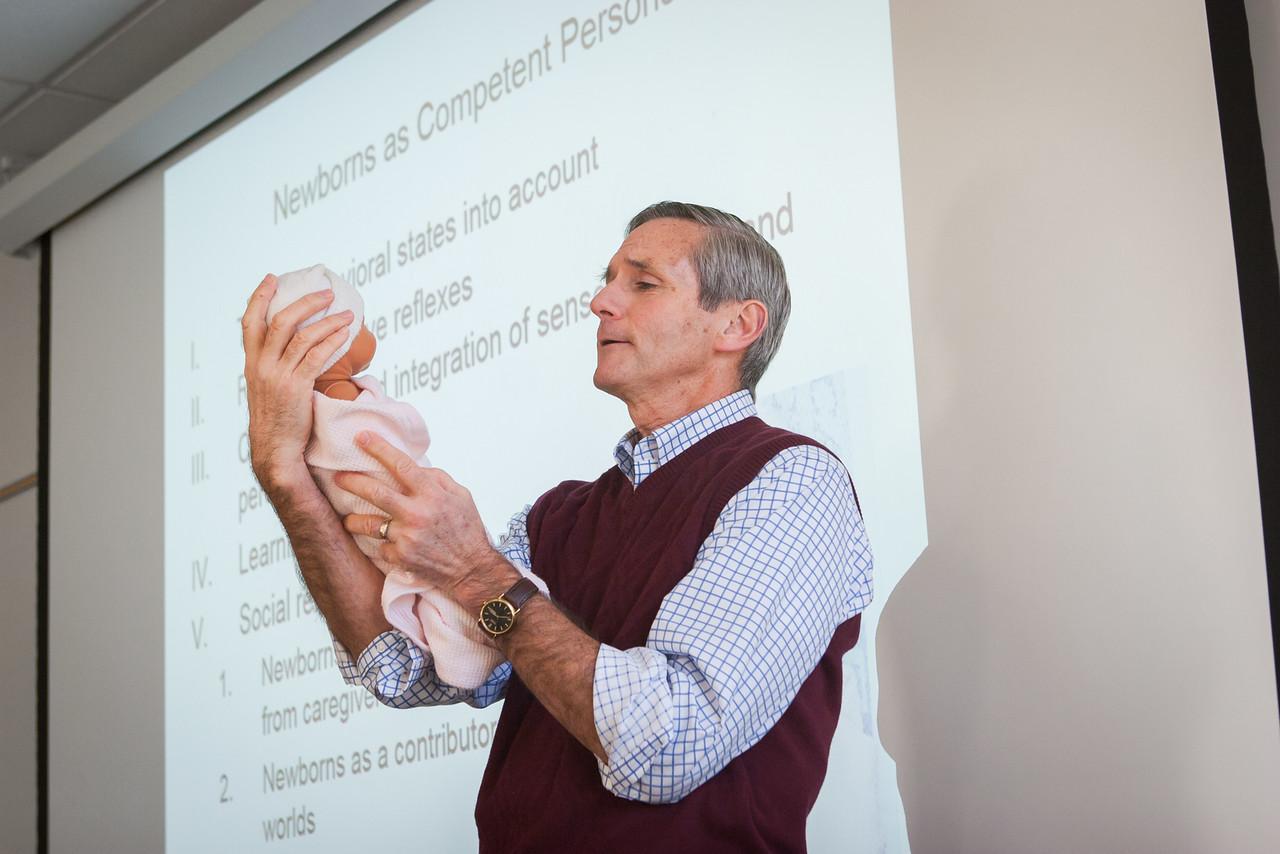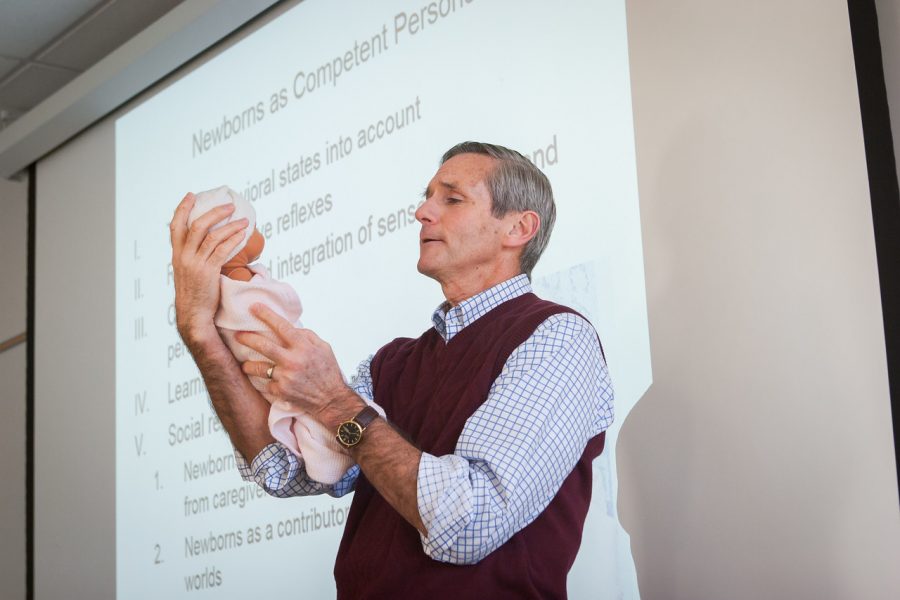Dr. Mícheál Roe’s office seems relatively average upon first glance, but look closer and you would notice a range of artwork and literature as interesting and varying as Roe’s resume.
As a professor of psychology and a specialist in human development, one might expect an array of dusty textbooks and not much else in his office. However, he breaks those expectations both in and out of Marston Hall.
Roe explained that he did not have a terribly linear path when it came to subject and vocation. “My experience was a bit more circuitous and was more making reasonable, wise choices at different points in time.”
This is evidenced by the room in which he works, his office on the first floor of Marston.
There are the expected books on Roe’s subjects covering the walls, but among them are framed photos of civil rights activists from around the world: Malala Yousafzai smiles triumphantly from the right corner, Nelson Mandela seems to look happily into the office in the upper left, above Roe’s desk, the Rev. Martin Luther King Jr. perches solemnly above the filing cabinets, and many more faces decorate the walls.
Alongside his psychology, education and philosophy degrees, the former SPU Professor of the Year is trained in anthropology and is particularly interested in worldwide social justice, animal behavior, sciences and more.
While retirement at the end of this year comes after a significant, successful career in academia, Roe has mixed feelings about leaving the post he has held for so long.
“I have a sense of anticipation and emancipation on the near horizon, June is just down the road, but I also describe this year as one that’s tinged with melancholy substantially.” Roe explains. “I mean good Lord, I’ve been a prof for 42 years!” he laughed.
As he detailed the major benchmarks in his career and his plans for the future, more and more subjects arose as areas of expertise or interest.
He got his undergraduate degree in anthropology, but found it not to be exactly the right field for him. He very calmly discussed his changing ventures and many degrees.
“I ultimately didn’t enter the field of anthropology. … What really brought me into the field of psych was doing voluntary service my senior year at the University of California,” he explained.
“I was working with severely, profoundly mentally disabled people. I discovered that I had a sort of place in my heart for individuals with special needs. I ultimately pursued that in my master’s degree.”
Having found an area of focus, the younger Roe pursued it until he was able to narrow it more closely into the field he was most fascinated by. “I found that I was even more interested in the development of the developmental disabilities, if you will,” Roe explained.

“That moved me into the developmental side of things. There wasn’t a very clear sense of calling or vocation at this point, other than the fact that I was interested in developmental matters,” Roe continued. “So I ended up getting my doctorate, and I happened to have a strong background in biology and chemistry from my undergrad.”
Once he found that he loved researching, mentoring, teaching and the like, he started applying to teach at universities. He applied to some schools that were, like SPU, smaller, Christian colleges, and he applied to some that were not. It was not until he started working at a liberal arts university in the Twin Cities that he started to understand the appeal of such an educational environment.
“It was when I started teaching in a liberal arts environment and realized the freedom I had to be transparent and be a whole person in my teaching that I began to really become an advocate for Christian higher education,” Roe said.
Later, Roe and his wife Janet were looking to move to the West Coast at the same time that SPU was looking for a chair of the psychology department. He felt that it was about time in his career to step into a leadership position, and he accepted.
He decided to stay at SPU because of the community he built here, and the people around him as he did the work he so enjoyed in the classroom.
“I certainly found a sense of belonging within social and behavioral science here. I found a good connection in the natural scientists, among the biologists. I was in Alexander hall at the time, so I was regularly bumping into colleagues in theology. I found a home among these colleagues,” Roe explained.
Outside of SPU, Roe was also getting involved with other work that he was passionate about. It was projects like serving as the consultant for the Cowlitz Native American tribe in their mission to receive federal recognition.
“Well, it was finding work that was fulfilling. I was focusing on Pacific Northwest Native Americans, particularly those who were members of tribes who were unrecognized, unacknowledged by the US government, many of whom continue to be unrecognized and are living close to 200 years of injustice,” Roe remembers.
This passion is reflected in the artwork in his office, placed carefully among the books like trophies. Roe proudly displays Native American art around his office, some of which was gifted to him in an official ceremony during his work as a consultant with the Cowlitz tribe, doing research to aid in their recognition process.
This is not the only area of social justice in which Roe is interested, however.
As evidenced by the photographs in his office, his passion for civil rights issues carried into many areas of his career. One of his favorite memories from his career, in fact, was working with students in social justice issues that mattered to them.
“For about 20 years I was the faculty advisor for our chapter of Amnesty International,” said Roe.
Amnesty International is a London-based organization focused on human rights, with over seven million members globally.
“What that did is it brought into my circle wonderfully gifted and capable students with a strong international and social justice interest,” he continued. “That’s a memory that I look back on and think ‘those were wonderful years.’”
Many of Roe’s other most treasured memories include his family, especially when they could interact with the school and his career.
When Roe won SPU Professor of the Year in 1993, he most fondly remembers the reactions of his then-young children to the ceremony and celebration involved. “There was some nice applause, and things of that sort, but it was a particularly nice memory because my kids were … just starry eyed. They didn’t care necessarily about why we were there, but they were in the middle of a basketball court with the audience all around them and that just made them starry eyed,” he remembered joyfully.
He is deeply proud of his blended, multicultural, large family with eight grandkids, and says that he looks forward to spending as much time with them as he can in retirement.
In retirement, he wants to continue to pursue his areas of interest and passion outside of the classroom as a docent, someone who aids professors and is able to help teach. “I love to learn, and I want to keep my mind active,” Roe said.
He also wants to get involved with behavioral science if he can, saying that he loves citizen science and would be excited to work with animal higher intelligence as well.
Finally, a call towards service is likely to take up much of his time post-SPU.
“We can completely overwhelm our schedules with opportunities for voluntary service. From local food banks, to issues of homelessness, to dealing with issues of drug addictions.” Roe plans to get involved through his church, the Seattle Mennonite Church, which he has been involved with since the late 1980s.
Despite his many plans, Roe looks fondly back on his years as a professor.
“I am a different person today than I was 42 years ago and I am very thankful for that,” he said.
He has learned significant lessons in his career, such as the importance of questioning and searching for an answer and not always insisting upon knowing right away.
“Today, I am much more willing to recognize that there may not be ‘the answer,’ that it’s much more contextual, that dissonance is not evidence necessarily of a lack of resolution, that dissonance may in fact be the way God intended humankind to live.”
All in all, he says that he takes three major lessons away from his 42 year career in academics.
“The importance of gentleness. The importance of humility. The importance of being at ease with not knowing. And those all go together, by the way.”

















































































